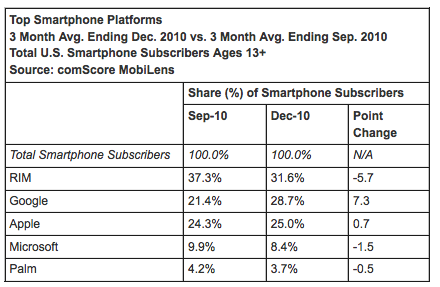Nokia Is The New Yahoo: Microsoft OS, Bing To Power Its Smartphones
The enemy of my enemy is my friend. Today, as widely expected, Nokia adopted Windows as its smartphone software. Its other mobile operating systems, Symbian and MeeGo, will not entirely disappear but Nokia will be building and distributing Windows Phones as its primary competitive offering to go head-to-head with the iPhone and Android. That could […]
The enemy of my enemy is my friend. Today, as widely expected, Nokia adopted Windows as its smartphone software. Its other mobile operating systems, Symbian and MeeGo, will not entirely disappear but Nokia will be building and distributing Windows Phones as its primary competitive offering to go head-to-head with the iPhone and Android.
That could give Bing a huge boost as the default search engine (and search marketing platform) on those phones.
For Microsoft this is a coup, for which it may have paid millions according to the NY Times. (Apparently Nokia won’t be adopting Android any time soon.) For Nokia it’s an admission of failure but also offers a “way back” to relevance in the smartphone market given that its home-grown smartphone software has not been competitive.
Though it has almost no presence in the US and is losing share rapidly in Europe Nokia remains the largest hardware OEM in the world. Windows Phones have received positive reviews but they’re having tremendous difficulty winning consumer attention and adoption. Gaining this kind of distribution and potential marketing will dramatically raise the profile of Windows Phones. The big question is: will consumers care?
The deal announced today bears similarities to Microsoft’s search deal with Yahoo in my mind. It’s own product faltering Yahoo turned to Microsoft to power search, with mixed results so far.
For example, Yahoo has suffered a brain drain and has not seen its search share grow (effectively at all). There has also been a negative impact on the company’s reputation and brand among tech journalists and bloggers; Yahoo has had to keep convincing people that it hasn’t abandoned the search market and that it’s a technology company.
However Yahoo has saved on R&D, headcount and other “capex” that might otherwise be going into search. Nokia will also save money on R&D by ceasing to invest in its own smartphone platform.
The analogy between Yahoo and Nokia isn’t perfect but it’s there and it may become more applicable over time. The press release out today has a laundry list of who will do what for whom, which reminds me of the Yahoo-Microsoft release. Here are some of the bullets from the Nokia-Microsoft agreement:
- Nokia would adopt Windows Phone as its principal smartphone strategy, innovating on top of the platform in areas such as imaging, where Nokia is a market leader.
- Nokia would help drive the future of Windows Phone. Nokia would contribute its expertise on hardware design, language support, and help bring Windows Phone to a larger range of price points, market segments and geographies.
- Nokia and Microsoft would closely collaborate on joint marketing initiatives and a shared development roadmap to align on the future evolution of mobile products.
- Bing would power Nokia’s search services across Nokia devices and services, giving customers access to Bing’s next generation search capabilities. Microsoft adCenter would provide search advertising services on Nokia’s line of devices and services.
- Nokia Maps would be a core part of Microsoft’s mapping services. For example, Maps would be integrated with Microsoft’s Bing search engine and adCenter advertising platform to form a unique local search and advertising experience
- Nokia’s extensive operator billing agreements would make it easier for consumers to purchase Nokia Windows Phone services in countries where credit-card use is low.
- Microsoft development tools would be used to create applications to run on Nokia Windows Phones, allowing developers to easily leverage the ecosystem’s global reach.
- Nokia’s content and application store would be integrated with Microsoft Marketplace for a more compelling consumer experience.
(Emphasis mine.)
Google “owns” mobile web search as well as mobile-search advertising right now. And this deal is a much bigger one for Bing than its earlier Verizon agreement, which I would imagine has turned out to be a disappointment at best for Microsoft.
Microsoft and Nokia will pool their services and hopefully developer communities to create a more potent ecosystem around both Nokia and Windows Phones. The latter lags significantly in app development.
Despite being born of mutual hardship and frustration this deal makes tremendous sense for both parties — on paper.
With the iPhone and Android dominating the smartphone market and grabbing most developer mindshare it very much remains to be seen whether the new partnership can break through with developers and consumers. At a minimum we can expect that Nokia and Microsoft will sell more Windows Phones than in the absence of the partnership.
Here are Nokia’s CEO Stephen Elop and Microsoft CEO Steve Ballmer discussing the deal and its benefits:
[youtube]https://www.youtube.com/watch?v=rTCwf6dXZOg&feature=player_embedded#at=251[/youtube]
Related entries:
- Live Blogging Google’s ThinkMobile Event
- Deal Puts Microsoft Live Search On Dell Computers, Verizon Phones — Will It Help?
- As Verizon Implements Bing Default Search Deal, Company Sees User Backlash
- Google Will Make $10 Per Android User In 2012: Report
- Android Closing On BlackBerry As Verizon iPhone Launch Approaches
- Google’s Mobile Moves Tighten Its Grip On Local
- A Year Later Even Google Surprised By Success Of Click-To-Call
Contributing authors are invited to create content for Search Engine Land and are chosen for their expertise and contribution to the search community. Our contributors work under the oversight of the editorial staff and contributions are checked for quality and relevance to our readers. The opinions they express are their own.
Related stories
New on Search Engine Land

